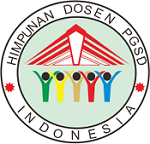THE EFFECTIVENESS OF COOPERATIVE LEARNING IN THE COURSE OF MATHEMATIC PROBLEM SOLVING
Abstract
Problems in mathematics are a challenge that needs solving but the solution cannot be done by using routine procedures. Understanding the problem as well as wealth of experience and strategy is needed to solve these problems. Students need experiences that can be obtained through interaction with others in cooperative learning. Different strategies that may emerge from others can enrich their experiences. The study was conducted to determine the effectiveness of cooperative learning in mathematics problem solving courses. The research method used is descriptive qualitative research methods. The object of research is the effectiveness of group learning in mathematics problem solving courses which include four procedures: understanding problems, planning strategies, solving, and checking answers. The research subjects are fifth semester students of PGSD STKIP PGRI Pacitan study program in the academic year 2019/2020. Sources of data in this study are: (1) Mathematical problem solving test data (2) Observation data during the lecture process (3) Group learning questionnaire data. Test of validity of the data is done through triangulation technique. The results showed that group learning in mathematics problem solving courses had fulfilled the characteristics of cooperative learning, providing benefits to students. And the effectiveness of four mathematical problem-solving procedures resulted in 80% for problem understanding, 80% for strategic planning, 70% for solving math problems, and 75% for checking math problem solving.
Keywords: mathematical problem solving; cooperative learning; mathematics.
Full Text:
PDFReferences
Billstein, R., Libeskind, S., & Lott, J. W. (2014). A problem solving approach to mathematics for elementary school teachers (11th ed.). New York: Pearson.
Burton, G. M., et al. (1994). Mathematics plus. Florida: Harcourt Brace & Company.
Endang Setyo Winarni & Sri Harmini. (2011). Matematika untuk pgsd. Bandung: PT. Remaja Rosdakarya.
Hino, K. (2007). Toward the problem-centered classroom: trends in mathematical problem solving in japan. Journal ZDM mathematics Education, 39, 503-504. Retrieved fromhttp://centroedumatematica.com/ciaem/articulos/universitario/conocimiento/Toward%20the%20problemcentered%20classroom%3A%20trends%20in%20mathematical%20problem%20solving%20in%20Japan*Hino,%20Keiko%20*Keiko%20Hino.pdf
Isjoni. (2009). Cooperative learning efektivitas pembelajaran kelompok. Bandung: Alfabeta.
Pimta, S., Tayruakham, S., & Nungchalem, P. (2009). Factors influencing mathematic problem solving ability of sixth grade students. Journal of Social Sciences, 5(4), 381-385. Retrieved from http://files.eric.ed.gov/fulltext/ED506983.pdf
Morgan, B. M., Rubin, R., & Carlan, V. G. (2005). Cooperative learning, mathematical problem solving, and latinos. International J. for Mathematics Teaching and Learning. 6 (3):203-226. Diunduh dari: http://www.cimt.plymouth.ac.uk/journal/morgan.pdf pada 1 November 2019.
Musser, G. L., Burger, W. F., & Peterson, B. E. (2011). Mathematics for elementary teachers a contemporary approach. Hoboken: John Wiley & Sons, Inc.
NCTM. (2000). Principles and standards for school mathematics. Reston, VA: Author.
Nurhadi. 2004. Pembelajaran kontekstual dan penerapannya dalam kbk. Malang: UM Press.
Polya, G. (1962). Mathematical discovery: on understanding, learning, and teaching problem solving. Toronto: John Willey & Sons.
Polya, G. (1973). How to solve it.: a new aspect of mathematical method. Princeton: Princeton University Press.
Runtukahu, J. T., & Kandou, S. (2014). Pembelajaran matematika dasar bagi anak berkesulitan belajar. Yogyakarta: Ar- Ruzz Media.
Souviney, R. J. (1994). Learning to teach mathematics (2nd ed). New York: Macmillan Publishing Company.
Supriyono, A. (2011). Cooperative learning teori dan aplikasi paikem. Yogyakarta: Pustaka Pelajar.
Van-Goundy, B. A, (2005). 101 activities for teaching creativity and problem solving (2nd ed). Boston: Pearson Education, Inc.
Wahyudi & Anugraheni, I. (2017). Strategi pemecahan masalah matematika. Salatiga: Satya Wacana University Press.
DOI: https://doi.org/10.25134/ijete.v1i2.3683
Refbacks
- There are currently no refbacks.
Copyright (c) 2020 Indonesian Journal of Elementary Teachers Education

This work is licensed under a Creative Commons Attribution-ShareAlike 4.0 International License.




